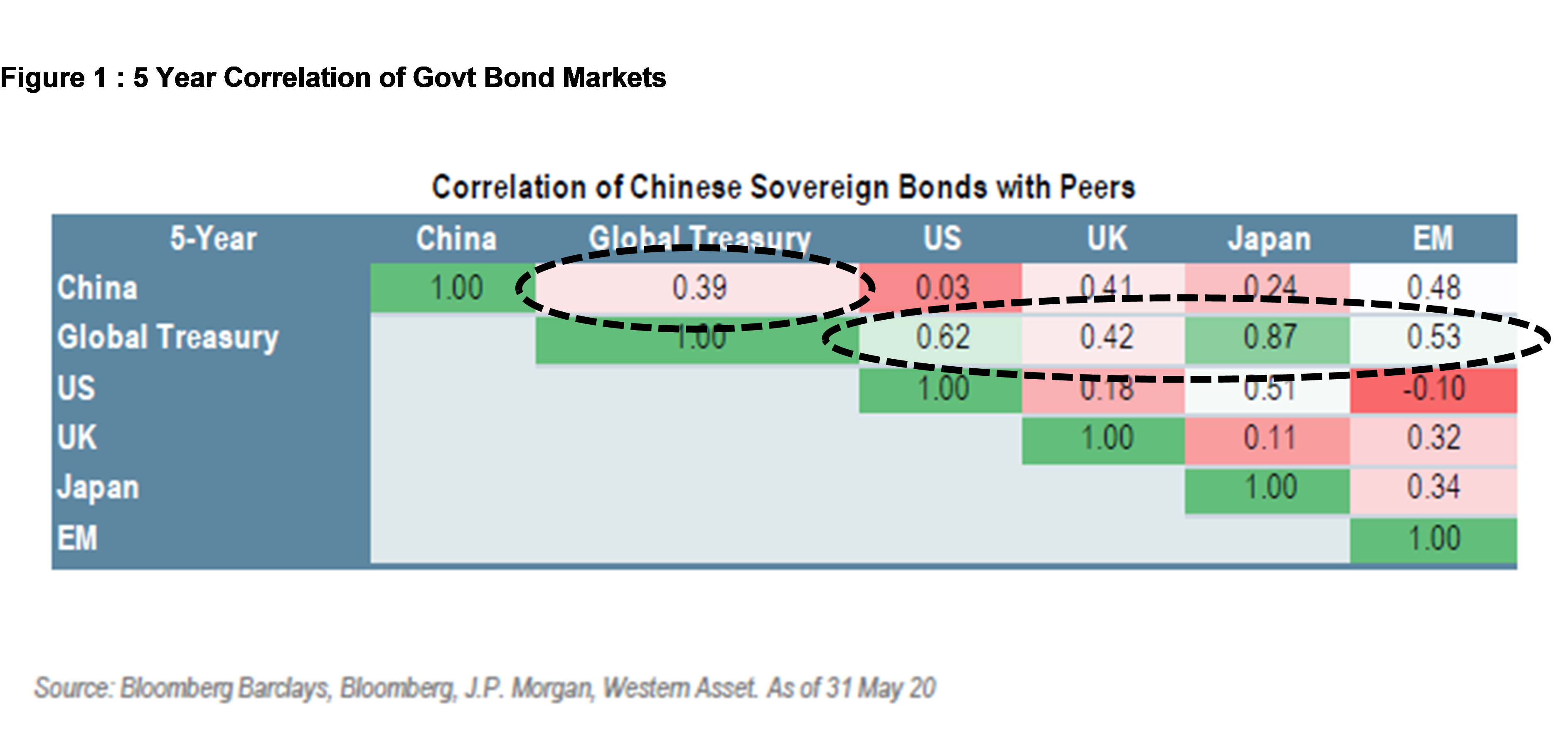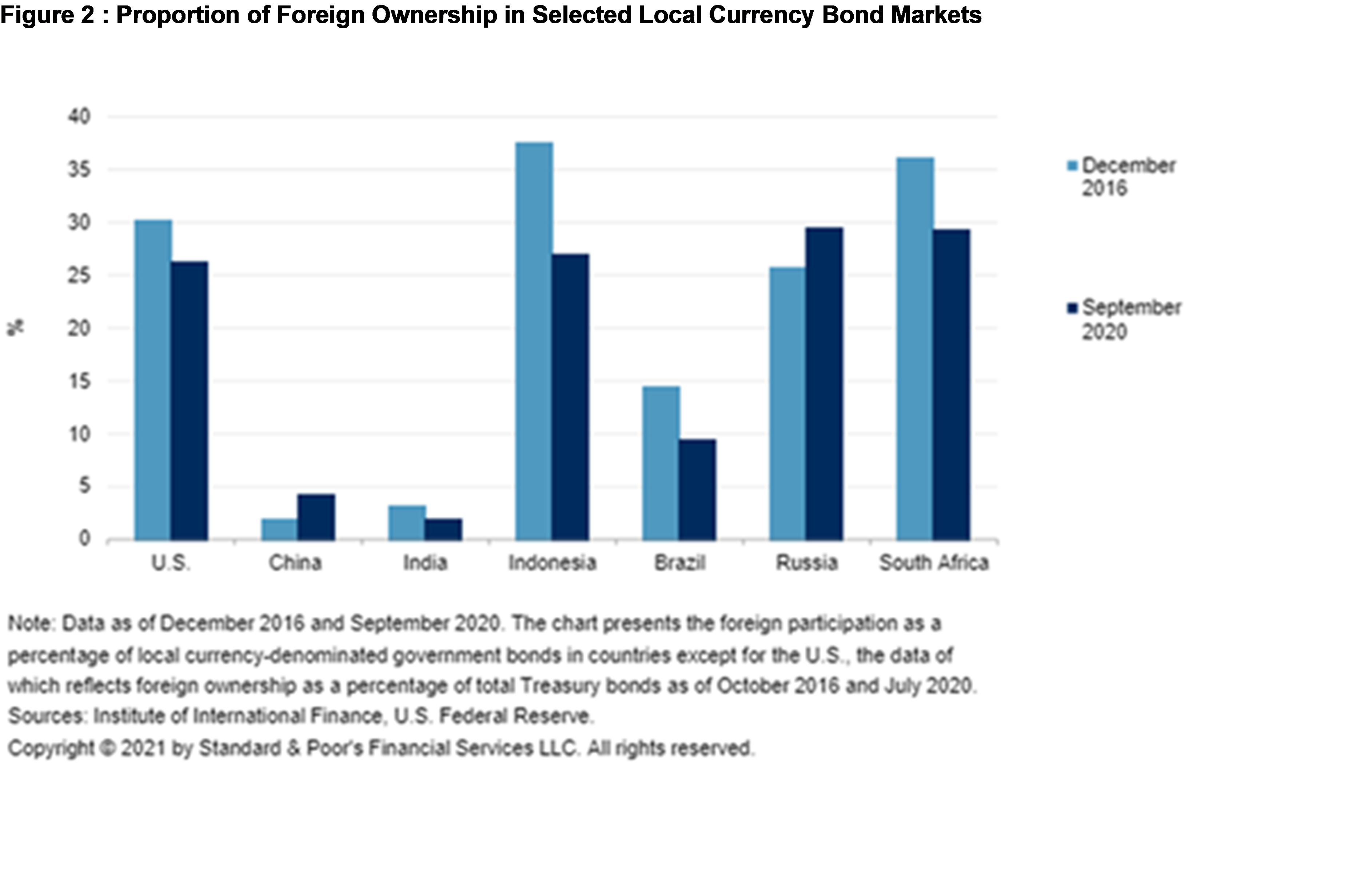Chinese bonds: Focus on fundamentals not historical correlations
One of the benefits often touted from adding Chinese exposures to global bond portfolios are the diversification benefits arising from the lower global bond correlations they bring. This has led some to argue that material exposures to Chinese bonds can reduce the risk within global bond funds while still earning a higher yield. Though there is some support for such claims, they also highlight the need to remain wary of focusing on such historical relationships, rather than the fundamentals, when making investment decisions.
For some investors, one of the most notable features of the Chinese bond market has been its low correlation with the bond markets in developed countries. This low correlation can be seen by considering the five-year correlations with other developed market bond markets shown in Figure 1 (1).

Considering such correlations highlights several key points regarding the behaviour of Chinese bond markets. Firstly, the low correlation evidenced historically is, in some ways, not dissimilar to that exhibited by Emerging Markets. This should not be entirely surprising given that, despite its size, Chinese bond markets are still evolving. By that, I mean they have certain characteristics in common with Emerging Markets.
Secondly, China exhibits a surprisingly low correlation relative to emerging markets' - and is indeed materially lower correlated here - when compared with bond markets globally, as measured by Global Treasuries. Such correlation characteristics have seen some investors view the Chinese bond market as a lower risk way to access higher-yielding securities within a global fixed income portfolio. In such instances, they seek to gain a higher return while lowering the risk of the overall global bond portfolio.
Though there is no questioning the historically low correlations between Chinese bonds and global treasury bonds, the factors driving this low correlation are more relevant. The answer to this would appear to revolve around two interrelated factors:
- Capital controls in China limit the extent to which capital can flow into and out of bond markets.
- Linked to the above point, the low level of foreign ownership within Chinese bond markets, as shown in the following chart.

Though foreign ownership in China’s bond market has been increasing it is still materially lower than seen in other local currency bond markets. The impact of both these factors is that global events tend to have less of an impact on Chinese bond yields than evidenced in other markets; i.e. domestic factors are more material drivers of movements in Chinese bond yields.
For those advocating the diversification benefits of Chinese bonds for global bond portfolios, the key question becomes whether these drivers of the lower correlation are expected to persist? The answer to this question is less promising given that there is little doubt that the Chinese government will continue its program of financial liberalisation along with the ‘opening up’ of capital markets to foreign investors.
Though the pace of China's liberalisation drive is unclear and indeed may prove variable based on domestic factors, it will inevitably continue. Linked to this will be the ongoing increase in foreign investor participation within the Chinese bond markets. This is shown by the inclusion of China within more global bond indices, meaning the foreign participation within China’s financial markets will increase. The evolution of both these factors will likely see correlations rise as capital flows become more integrated with global developments.
The lower correlation exhibited so far by the Chinese bond market provides the opportunity for investors to access higher yields, while at the same time increasing the diversification benefits within their global fixed income portfolios.
The risk for investors is that such diversification benefits will dissipate as Chinese financial markets continue to evolve and increasingly accept foreign investors. Though such evolution may take time, the uncertainty for investors focussing on correlations to justify investment decisions revolves around the pace of change and how sustainable these diversification benefits prove. The Chinese government may surprise with respect to the pace of financial market liberalisation with some "big bang" reforms aimed at speeding up the process. Given such risks, rather than relying on historical statistical relationships to justify investing in Chinese bonds, investors should be focusing on the fundamentals when determining the relative attraction of including Chinese bonds within a global fixed income portfolio (2).
Not an existing Livewire subscriber?
If you're not an existing Livewire subscriber you can sign up to get free access to investment ideas and strategies from Australia's leading investors.
And you can follow my profile to stay up to date with other wires as they're published – don't forget to give them a “like”.
(1) The focus of correlations is on Global Treasuries given the context of the discussion is the inclusion of Chinese fixed income exposure into a broad-based developed market bond portfolio.
Some may also note that the low correlation of the UK is similar to China though this is likely to be period-specific and associated with idiosyncratic factors associated with the drawn-out BREXIT process.
1 topic
1 contributor mentioned
Clive Smith is an investment professional with over 35 years experience at a senior level across domestic and global public and private fixed income markets. Clive holds a Bachelor of Economics, Master of Economics and Master of Applied Finance...
Expertise
Clive Smith is an investment professional with over 35 years experience at a senior level across domestic and global public and private fixed income markets. Clive holds a Bachelor of Economics, Master of Economics and Master of Applied Finance...

